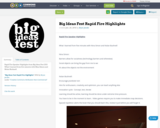
Rapid Fire Speaker Highlights from Big Ideas Fest 2013
What I learned from five minutes with Nina Simon and Nolan Bushnell
- Subject:
- Arts and Humanities
- Date Added:
- 01/10/2014

Rapid Fire Speaker Highlights from Big Ideas Fest 2013
What I learned from five minutes with Nina Simon and Nolan Bushnell
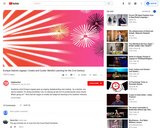
Academic artist Enrique Legaspi grew up singing, skateboarding, and creating. As a teacher, one day he realized, "I'm doing everything I can, I'm staying up late, but I'm producing the same results. What's going on?" Now that he's begun to modify and adapt his teaching to his students' interests, Enrique's students are creating, curating and sharing their work using video and social media -- and it's made all the difference.
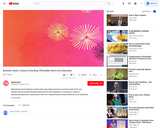
Motivated by the limitations of both public and private schools to meet the needs of his son, Internet Archive founder Brewster Kahle and his wife embarked on a mission to create an educational experience customized to their son. Inspired by their results, Kahle set out to determine if this model of customized education could scale beyond those who could afford it. He shares his surprising findings in this Big Ideas Fest presentation.÷
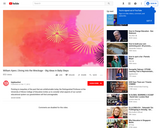
Pointing to inequities of the past that are unfathomable today, the Distinguished Professor at the University of Illinois College of Education invites us to consider what aspects of our current educational system our grandchildren will find unimaginable.
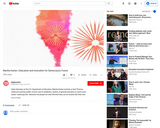
Under Secretary at the U.S. Department of Education, Martha Kanter reminds us that Thomas Jefferson's primary public concern was to establish a system of general education to reach every citizenÄbelieving that "whenever the people are well informed they can be trusted with their own government." Today, as our lauded history of producing the best-educated citizenry in the world is slipping through our fingers, Kanter argues that people need to learn to think critically not only to succeed in their jobs, but to preserve our great democracy.
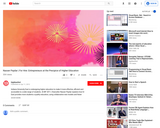
Indiana University East is redesigning higher education to make it more effective, efficient and accessible to a wide range of students. At BIF 2011, Chancellor Nasser Paydar explains how IU East provides more students a quality education, using collaborative new models and fewer resourcesÄgoing from the lowest retention rates among all Indiana University campuses to the highest in four years.÷
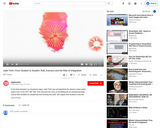
In her final semester as a business major, Jade Trinh was uninspired by the obvious career paths open to her. In her 2011 BIF Talk, Trinh recounts her story of stumbling into an entrepreneurship course that revealed an unexpected and exciting new path. She argues that students crave the kinds of real-world, experiential learning environments she was fortunate enough to encounter and urges that experiences like hers should not be the exception, but the rule.
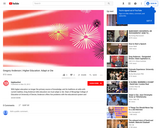
With higher education no longer the primary source of knowledge, and its traditions at odds with current realities, Greg Anderson tells educators we must adapt or die. Dean of Morgridge College of Education at University of Denver, Anderson offers five problems with the educational system and three fundamental obstacles we need to overcome to remain relevant.
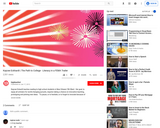
Kaycee Eckardt teaches reading to high school students in New Orleans' 9th Ward. Her goal, to equip all scholars for world-changing pursuits, requires taking a chance on innovative teaching, prototyping and piloting new ideas. "To pause, or to hesitate, or to forget to innovate because of fear, that's the only moment that we will fail."
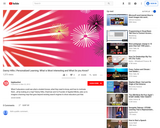
What if educators could see what a student knows, what they need to know, and how to motivate them...all by looking at a map? Danny Hillis, Chairman and Co-Founder of Applied Minds, asks us to imagine a learning map that goes beyond existing search engines to show educators just that.
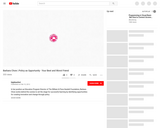
In her position as Education Program Director of The William & Flora Hewlett Foundation, Barbara Chow works behind the scenes to set the stage for successful learning by identifying opportunities for creating innovation and change through policy.
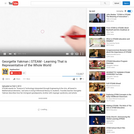
STEAM stands for "Science & Technology interpreted through Engineering & the Arts, all based in Mathematical elements," and aims to bring FUNctional literacy to students. Founder/teacher Georgette Yakman describes how her immigrant grandparents, brother with Asperger syndrome, and artistic stepfather led her to bring Arts into STEM.
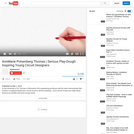
At the University of St. Thomas in Minnesota, this engineering professor and her team demonstrate that science or engineering lessons can be found in almost anything -- and a sense of play can make those lessons accessible and incite young minds.
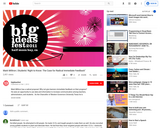
Mark Milliron has a radical proposal: Why not give learners immediate feedback on their progress? He sees an opportunity to use data and information to increase communication among teachers, administrators, and students. As the Chancellor of Western Governors University Texas he is exploring how new technologies for real-time assessment can open doors to motivated students and empowered teachers.